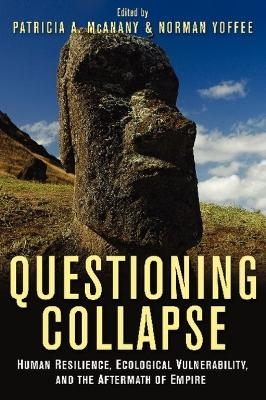
Questioning Collapse
Cambridge University Press (Verlag)
978-0-521-73366-3 (ISBN)
Questioning Collapse challenges those scholars and popular writers who advance the thesis that societies - past and present - collapse because of behavior that destroyed their environments or because of overpopulation. In a series of highly accessible and closely argued essays, a team of internationally recognized scholars bring history and context to bear in their radically different analyses of iconic events, such as the deforestation of Easter Island, the cessation of the Norse colony in Greenland, the faltering of nineteenth-century China, the migration of ancestral peoples away from Chaco Canyon in the American southwest, the crisis and resilience of Lowland Maya kingship, and other societies that purportedly 'collapsed'. Collectively, these essays demonstrate that resilience in the face of societal crises, rather than collapse, is the leitmotif of the human story from the earliest civilizations to the present. Scrutinizing the notion that Euro-American colonial triumphs were an accident of geography, Questioning Collapse also critically examines the complex historical relationship between race and political labels of societal 'success' and 'failure'.
Patricia A. McAnany is Kenan Eminent Professor in the anthropology department at the University of North Carolina, Chapel Hill. A member of the editorial board of the Journal of Anthropological Archaeology, she has received fellowships from the National Endowment for the Humanities, Dumbarton Oaks, and the Radcliffe Institute for Advanced Study at Harvard University. She is the principal investigator of the Xibun Archaeological Research Project in Belize (www.bu.edu/tricia) and of the Maya Area Cultural Heritage Initiative (www.machiproject.org) that works with descendent Maya communities. She has authored Living with the Ancestors: Kinship and Kingship in Ancient Maya Society, edited K'axob: Ritual, Work and Family in an Ancient Maya Village, and recently co-edited Dimensions of Ritual Economy. Norman Yoffee is a scholar of ancient Mesopotamia and social evolutionary and anthropological theory. He teaches in the Departments of Near Eastern Studies and Anthropology at the University of Michigan, Ann Arbor. He is the author and editor of eleven books, including Myths of the Archaic State: Evolution of the Earliest Cities, States, and Civilizations, Excavating Asian History: Interdisciplinary Studies in History and Archaeology and Negotiating the Past in the Past: Identity, Memory, and Landscape in Archaeological Research, and the Cambridge World Archaeology series.
1. Why we question collapse and study human resilience, ecological vulnerability, and the aftermath of empire Patricia A. McAnany and Norman Yoffee; Part I. Human Resilience and Ecological Vulnerability: 2. Ecological catastrophe, collapse, and the myth of 'ecocide' on Rapa Nui (Easter Island) Terry L. Hunt and Carl P. Lipo; 3. Did the medieval Norse society in Greenland really fail? Joel Berglund; 4. Calamities without collapse: environment, economy, and society in China, c.1800–1949 Kenneth Pomeranz; Part II. Surviving Collapse: Studies of Societal Regeneration: 5. Marketing conquest and the vanishing Indian: an indigenous response to Jared Diamond's archaeology of the American southwest Michael Wilcox; 6. Bellicose rulers and climatological peril? Retrofitting 21st century woes on 8th century Maya society Patricia A. McAnany and Tomas Gallareta Negrón; 7. Collapse in ancient Mesopotamia: what happened, what didn't Norman Yoffee; Part III. Societies in the Aftermath of Empire: 8. Advanced Andeans and backward Europeans: structure and agency in the collapse of the Inca empire David Cahill; 9. Rwandan genocide: towards an explanation in which history and culture matter Christopher C. Taylor; 10. 'Failed' states, societal 'collapse', and ecological 'disaster': a Haitian lesson on grand theory Drexel G. Woodson; 11. The power of the past: environment, Aborigines, archaeology, and a sustainable Australian society Tim Murray; 12. Excusing the haves and blaming the have-nots in the telling of history Frederick Errington and Deborah Gewertz; Part IV. Reflections on Sustainability: 13. Sustainable survival J. R. McNeill.
| Zusatzinfo | 22 Maps; 62 Halftones, unspecified; 29 Line drawings, unspecified |
|---|---|
| Verlagsort | Cambridge |
| Sprache | englisch |
| Maße | 152 x 226 mm |
| Gewicht | 520 g |
| Themenwelt | Geisteswissenschaften ► Archäologie |
| Geisteswissenschaften ► Geschichte ► Allgemeines / Lexika | |
| Geschichte ► Allgemeine Geschichte ► Neuzeit (bis 1918) | |
| Geisteswissenschaften ► Geschichte ► Regional- / Ländergeschichte | |
| ISBN-10 | 0-521-73366-9 / 0521733669 |
| ISBN-13 | 978-0-521-73366-3 / 9780521733663 |
| Zustand | Neuware |
| Haben Sie eine Frage zum Produkt? |
aus dem Bereich


